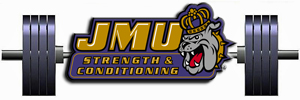Training Philosophy
The philosophy of the Strength & Conditioning program includes the following:
- Athletics are an integral part of the University’s overall educational
program, but academics come first.
- An athlete will never be asked or expected to participate in a Strength & Conditioning activity in conflict with his/her academic obligations.
- The welfare and safety of the athletes is paramount and always takes
precedence when asking them to perform an activity **.
- An athlete will never be asked, nor allowed, to perform a strength activity that the Strength & Conditioning staff feels is beyond his/her capacity to safely execute.
- An athlete will never be asked, nor allowed, to perform a conditioning activity that the Strength & Conditioning staff feels is beyond his/her capacity to safely execute.
to produce performances of elite magnitude in order to be competitive. In order to prepare an athlete to compete at this elite level, training must be intense and physically demanding. We coach JMU athletes to work at their maximum capabilities, and although all precautions are taken to safeguard against injuries, realistically, injuries are not totally avoidable.**Athletes competing at the NCAA Division-I level are expected
- The Strength & Conditioning staff are motivators and educators; we lead by guiding rather than ruling.
- Athletes need feedback in order to improve their performance. We project positive influence and feedback with the power of attitude and example. We do not berate or denigrate athletes in order to get our point across. We do, when needed, expose the athletes to the consequences of their actions, and, in a safe manner, push them to the point of a planned conditioning level to reveal a lack of commitment.
- We use a simple, direct approach, and concisely and clearly explain the principle-based reasons for everything we do.
- We inform the athletes as to what is expected of them, and reward those who achieve these expectations.
- The JMU Strength & Conditioning Program is based on the principles of Exercise Science; kinesiology, exercise physiology and biomechanics, as well as direct proven experience [refer to Strength & Conditioning Principles].
- We do not train JMU athletes to become bodybuilders, powerlifters or Olympic style weightlifters; rather, we train athletes to become better athletes. We train athletes to develop the components of athleticism; strength, power, flexibility, speed, agility, footwork, endurance, metabolic condition, body composition, mental focus and motivation.
- We utilize the principle of specificity, and therefore use free weight training as much as possible. Free weights allow athletes to move athletically, and not in a fixed motion pattern like most machines. We train movements and thereby train the muscles that produce these movements. But, realistically, certain movements are not ideally trainable with free weights, in which case we do utilize specific machines.
- We utilize explosive power training (plyometrics, power shrugs, power cleans, push presses, jerks, and power squats). Athletes with great power and explosiveness, for the most part, dominate athletics. With all other things being equal, the athlete with the greatest power and explosiveness will dominate his opponent. We follow a sequential progression, in order to maximize safety and optimize success, for all explosive power movements.
- The JMU Strength & Conditioning facilities are modern, functional, well equipped, and a source of motivation and pride to the athletes and coaches they serve.
- Although, as coaches, we strive to extrinsically motivate the athletes we work with, intrinsic motivation is necessary in order for the athletes to fully optimize their performance. For this purpose the Strength & Conditioning facilities will be decorated in such a way to stimulate intrinsic motivation within the athletes.
- The JMU Strength & Conditioning facilities will be a place of great pride for the athletes as well as coaches, and administrators. They will be a tool in the recruiting process.
